Surrounded by seemingly unending external challenges, managers of domestic and international practices in the country are determined to focus beyond past limitations with a view to the prizes the future may bring. Luna Jin reports
Business strategies in China’s legal market have undoubtedly grown increasingly flexible and forward-thinking this past year and, like a sprinter constantly evolving technique and body to compete and shave that extra microsecond off the clock, the focus on moving forward with speed and efficiency is paramount.
Both Chinese and international law firms are now deftly applying their accumulated experience to day-to-day operations, client relationship management and expansion of their practices, keen to accelerate from an environment where the economic downturn has led to a partial contraction of legal business.
In time for our mid-year bi-monthly issue, China Business Law Journal presents its annual market report series exploring the ups and downs of the market in the past year and all the latest developments based on our surveys.
Yu Yongqiang, a partner at JunHe in Beijing, notes that competition from top law firms remains fierce and each will encounter stronger adversaries in their development. “Accordingly, broadening the sources of income and economising on expenditure will be the new task for us all,” he says.
Against such a backdrop, how are law firm managers strategising to ensure that they can seize emerging opportunities while maintaining a competitive edge? A good start towards answering this is exploring the most active sectors and practice areas in China’s legal market of late, and how partners from Chinese and foreign law firms are using their management acumen to break through objective constraints.
In addition, for dedicated discussions on law firms’ quantitative achievements, such as revenue, as well as the challenges and insights of the in-house counsel community in the past year, please refer to our articles Handling top-level domain name disputes and How to plan mass staffing adjustments, respectively.
Several major uncertainties affecting China’s economic recovery are evident: a domestic covid-zero policy, increasing international tensions, accelerated tightening of monetary policies in developed economies, continued fragility of global supply chains and a decline in domestic consumption are impeding a number of legal practice areas including offshore capital markets and outbound mergers and acquisitions.
However, the complex interplay of these factors has also led to a surge in demand for legal services in areas such as insolvency restructuring, dispute resolution, labour law and life sciences.
In the meantime, as China’s regulatory framework takes shape and the central government launches a new round of governance schemes with data compliance, environmental, social and governance-related (ESG) investment and compliance, anti-monopoly, urban renewal, etc., areas directly driven by policy are seeing unprecedented growth opportunities.
TESTING CLIENT RELATIONSHIPS
China’s pandemic policies have brought with them some tight travel restrictions, with lawyers’ business trips greatly reduced, challenging law firms’ ability to serve their clients and even forcing some to rethink their previous approaches to managing client relationships.
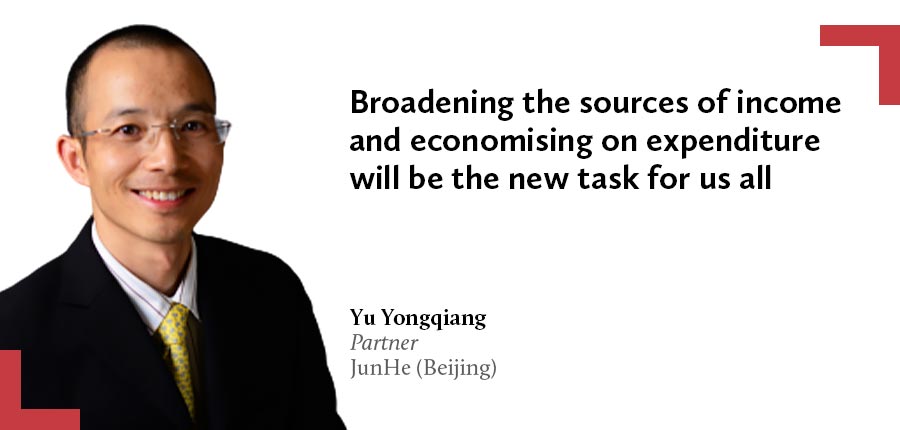
“Our strategy for this year is to keep the team stable by focusing more on existing loyal clients,” says Fan Jiannian, a partner at Gide’s Shanghai office. He explains that, via technological means such as “team negotiations, virtual due diligence and electronic signing”, Gide has helped clients to overcome the difficulties incurred and sign several M&A deals during Shanghai’s lockdown of nearly three months this year.
Lui Kanyi, the head of Pinsent Masons’ China practice in Beijing, notes that at a stroke the world of client relationships moved from face-to-face interaction to online. “The pandemic has highlighted, and amplified, like never before the increased centrality of digital marketing to effective business development,” he says.
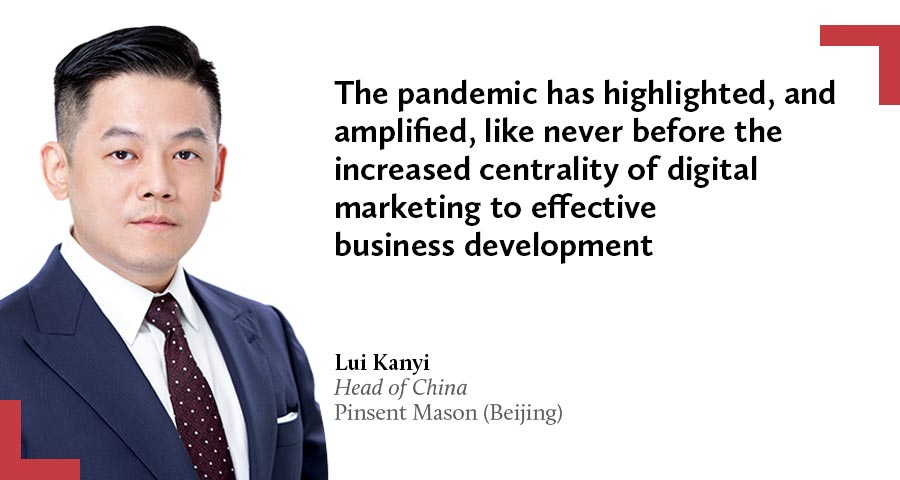
Pinsent Masons published more than 80 articles in 2021 on the WeChat platform, says Lui, which brought in a significant number of new followers and readers. “In addition, we continued to increase our Chinese content on the Chinese website, where we made a huge step forward in connecting with clients digitally.”
At this pivotal time, several firms have recognised the important role of IT in maintaining client relationships. Steven Zhou, a senior partner at Hui Ye Law Firm in Shanghai, says the firm, which formed one of the earliest labour law teams in China, has organised a number of webinars on labour and personnel management this year, with seasoned labour law experts from the firm’s various offices as speakers, achieving a cumulative total of more than 20,000 attendees.
Apart from continuing to offer webinars to clients, Landing Law Offices has “relaxed the deadlines for payment of legal fees to work with clients,” says Bill Gao, a senior partner at the firm in Shanghai.
George Lu, a Shanghai-based lead partner at Lanbai Law Firm, also notes that clients’ budgets have shrunk, and law firms with integrated operations can offer more flexibility. Lanbai’s integrated team “gives clients more options to meet their needs for different levels of legal services”.
While the past year has also been difficult for Chinese residents to travel outside of the country, some partners have managed to get out and return to international conferences this year in order to “enhance communication with clients and peers, and solve practical problems faced by clients”.
Zhu Zhigang, director of Wanhuida Intellectual Property in Shanghai, says that in the third year of the covid outbreak, the firm has adapted and is able to maintain close and efficient communication with their clients through technology, while six of the firm’s partners successfully travelled to the US this year to attend the International Trademark Association’s 144th Annual Meeting in Washington DC.
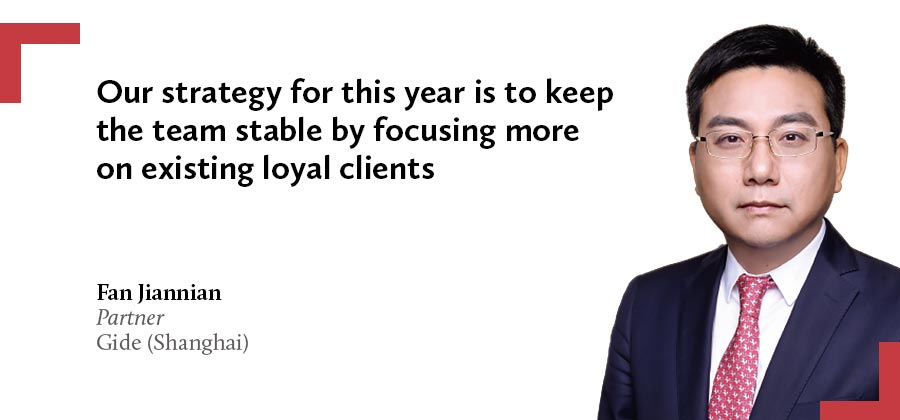
UPWARD TRENDS
What started as a series of specifications to help investors screen potential investment companies, ESG (environmental, social and governance) is now an internalised corporate compliance requirement as government regulation steps in. A number of law firms have confirmed that ESG-related businesses were very active in the past year.
Although there is currently no dedicated ESG legislation in China, ESG-related provisions can be found in fundamental legislation for the environment, corporate, labour and competition, as well as in the rules and guidance of exchanges.
Rossana Chu, the managing partner of LC Lawyers in Hong Kong, notes that well established clients have been enhancing their governance measures in respect of the “G” in ESG, But quite a proportion of entrepreneurs are still finding ways to achieve the “E” and “S” aspects.
She recommends that investors and companies conduct simulation tests and more in-depth due diligence on investment targets, diversify their supply chains and customer bases, have more regular reviews of internal controls, and enhance audits and assessments on suppliers.
A similar trend has been observed by Lui, of Pinsent Masons, who notes a significant increase in general activity levels across the board this year, particularly in business activities relating to cross-border construction and infrastructure, and energy and natural resources.
He says that the firm is acting on a number of complex and ground-breaking new projects including the world’s largest concentrated solar project, the largest green hydrogen project, the first 100% renewable-powered city, and the largest oil and gas investment in East Africa.
“Pent-up demand, the green energy transition, geopolitical tensions and shocks from the Ukraine war have all led to a significant refocus on investments and how capital is deployed,” says Lui.
Pinsent Masons also made seven appointments in the Asia-Pacific in April, almost all of whom specialise in the energy and infrastructure sectors, with an aim to further boost its service capabilities for the area.
In contrast to a dimming economy, insolvency restructuring business in the legal market is steadily growing. With a slowdown in production many companies are looking for ways to cut costs, and interlocking supply chains are transmitting negative effects to all sectors. Yu, of JunHe, points out that most companies, particularly small and medium-sized enterprises (SMEs) and those in the real estate sector, are facing unprecedented challenges.
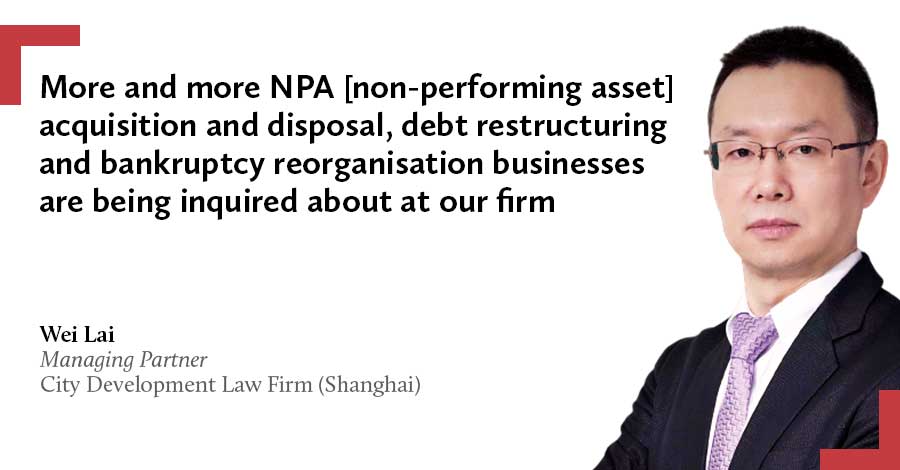
“For companies on the verge of bankruptcy but with the hope of recovery, having debtors negotiate and co-operate with stakeholders, thus leading the distressed companies out of trouble and back to life, is a good remedy,” he says.
With many companies in default crisis, services for disposing of non-performing assets (NPAs) are in high demand. Wei Lai, the Shanghai-based managing partner of City Development Law Firm, says that as some of the country’s top real estate companies have fallen into huge debt, related construction companies have also become embroiled in crisis, and “more and more NPA [non-performing asset] acquisition and disposal, debt restructuring and bankruptcy reorganisation businesses are being inquired about at our firm”.
At the same time, domestic and cross-border investment institutions and asset managers are actively seeking and competing for domestic investment opportunities in NPAs, he added.
The other countercyclical practice area that has emerged in the past two years is labour law. According to Zhou, of Hui Ye, major legal issues faced by clients in this arena include:
-
- telecommuting and flexible working arrangements for employees should the country face another nationwide lockdown;
- employee sharing;
- working hours and leave; and
- modification and termination of employees’ employment contracts.
“Many companies only engage in a fire-fighting style of handling labour disputes, or just one aspect of labour law risk prevention and control, failing to take an integral view of personnel management within the company,” he says.
Zhou recommends that companies methodically manage labour and personnel compliance in their businesses, establish corporate values and apply them in practice, reshape human resource management processes from a systematic, standardised and multi-jurisdictional perspective, and ultimately ensure stable operations.
Lu, of Lanbai, adds that companies are also not paying enough attention to new forms of employment and seem to have lost interest in the flexibility and cost competitiveness that new ways of employing workers bring. “Under the current economic and employment situation new ways of employing workers are coming out soon and could be ground-breaking.”
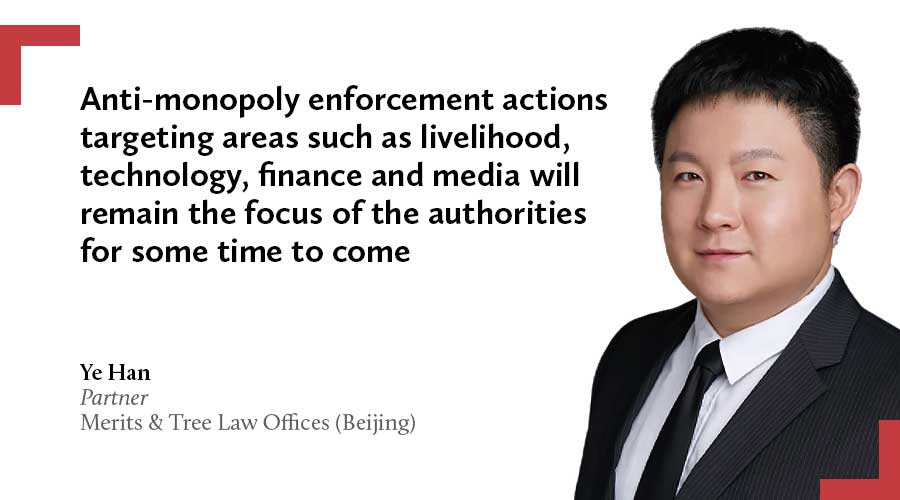
Regarding dispute resolution, the domestic economic downturn and the updates in the financial regulatory rules have given rise to a significant increase in several typical disputes. Zhang Wenliang, a Beijing-based partner at Merits & Tree Law Offices, observes that frequently occurring disputes include:
-
- financing disputes in the financial or similar sectors, mainly related to debt defaults;
- disputes between financial institutions/asset managers and investors triggered by governments no longer allowing for bailouts;
- exit disputes in the equity investment sector; and
- misrepresentation cases in the capital market sector amid renewed court adjudication rules this year from the Supreme People’s Court.
OMNIPRESENT COMPLIANCE
The past year has seen an unparalleled quantity of corporate compliance work, and it is becoming increasingly imperative to achieve compliance in areas such as antitrust, data security, international trade and cross-border investment. With this in mind, companies are having to re-examine their financing and expansion plans in the midst of global political conservatism, while the tough regulatory trend at home continues in 2022.
According to Scott Yu, a partner of Zhong Lun Law Firm in Beijing, judging from existing cases, companies will bear high costs in the event of major compliance pitfalls. He also expects that “the trend of corporate compliance regulation will continue for some time to come”. As a result, “avoiding compliance risks is in a way not an increase in business costs, but an increase in revenue”, he says.
Compared with multinational companies, domestic companies have in the past neglected legal compliance requirements and focused more legal resources on corporate development, says Yu. But things are very different today. As Chinese companies move from a period of rapid development to a relatively stable period of maturity, “we recommend that companies devote more legal resources to compliance in the future, and that they plan ahead and don’t wait until they are investigated before they start to investigate themselves,” he says.
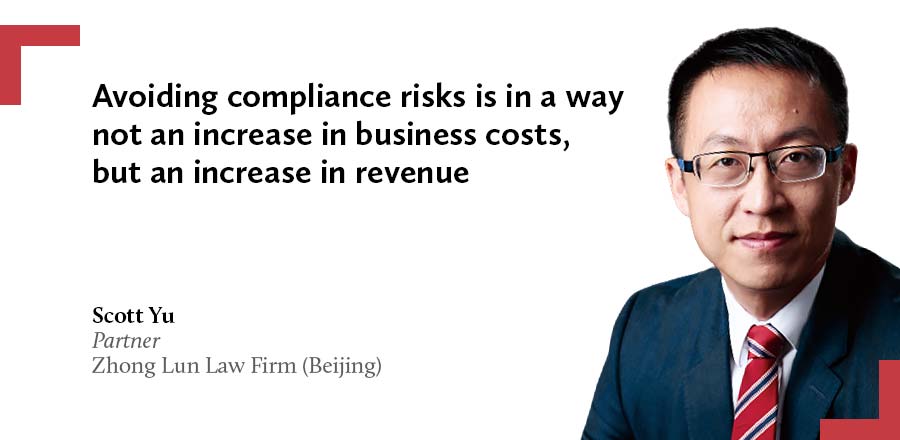
In the area of data compliance, the Cyberspace Administration of China issued a fine of more than RMB8 billion (USD1.2 billion) to Didi for violating cybersecurity and data laws, making it the highest fine globally to date in the area of data protection, far exceeding the EUR740 million (USD745.2 million) penalty that Amazon received a year ago for violating the EU’s General Data Protection Regulation (GDPR).
With a series of laws, regulations and policies – including the Cybersecurity Law, Data Security Law, Personal Information Protection Law, and Measures on Security Assessment of the Cross-border Transfer of Personal Information – enacted and in place, China’s legal framework for data protection has finally assumed a definite form.
Ulrike Glueck, managing partner of CMS China in Shanghai, says: “It imposes considerable challenges on companies in processing personal information during daily work, especially for business and HR management.”
Glueck also observes that competent authorities in the field of data regulation are also increasing enforcement and investigation activities at the local level. “It is particularly important for enterprises across industries to timely make compliance adjustments in order to comply with new regulatory requirements and to respond to increasingly stringent enforcement actions,” she suggests.
Tang Jiangshan, a partner in Haiwen & Partners’ Beijing office, says the main concerns of clients are whether companies need to make cybersecurity filings for their overseas listings, and the legal risks of data leaving the country.
“When conducting due diligence on transactional projects, companies often overlook whether the source of the data – especially how a client of a B2B business accesses the data – involves personal information, and whether the individual’s consent, or separate consent, is required,” says Tang. In practice, he suggests that clients should conduct specific data due diligence on data-driven companies.
In the anti-monopoly field, the Anti-Monopoly Law has seen its first amendment in 14 years of implementation following the authorities’ issuing of two astronomical fines of RMB18.2 billion and RMB3.4 billion against Alibaba and Meituan, respectively, for abusing their dominant market position in 2020.
Ye Han, a Beijing-based partner at Merits & Tree Law Offices, says: “The penalties for all types of monopoly violations have increased significantly. Anti-monopoly enforcement actions targeting areas such as livelihood, technology, finance and media will remain the focus of the authorities for some time to come.”
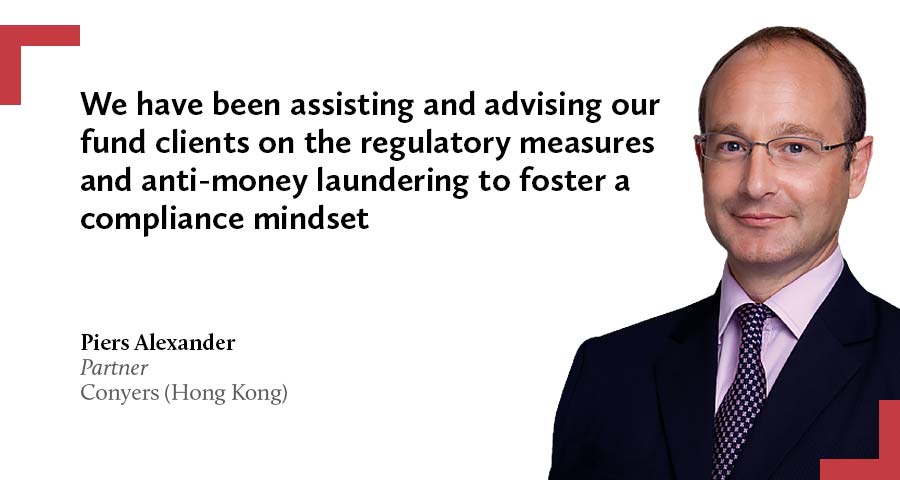
Updates to capital market exchanges have also created a demand for related legal services. Piers Alexander, a Hong Kong-based partner at Conyers, says the corporate practice of the firm’s Hong Kong office has been assisting its listed company clients to amend their constitutional documents in order to conform to amendments to the Rules Governing the Listing of Securities on The Stock Exchange of Hong Kong Limited, in relation to the overseas issuers listing regime that came into force on 1 January 2022.
Entities in offshore jurisdictions should be mindful of the legal updates in the region and keep pace, notes Alexander. The introduction of the Private Funds Act of the Cayman Islands means that there are now more than 13,000 additional funds subject to regulation by the Cayman Islands Monetary Authority.
“The authority has been undertaking regulatory investigations as a way of improving compliance by regulated entities,” he says. “We have been assisting and advising our fund clients on the regulatory measures and anti-money laundering to foster a compliance mindset.”
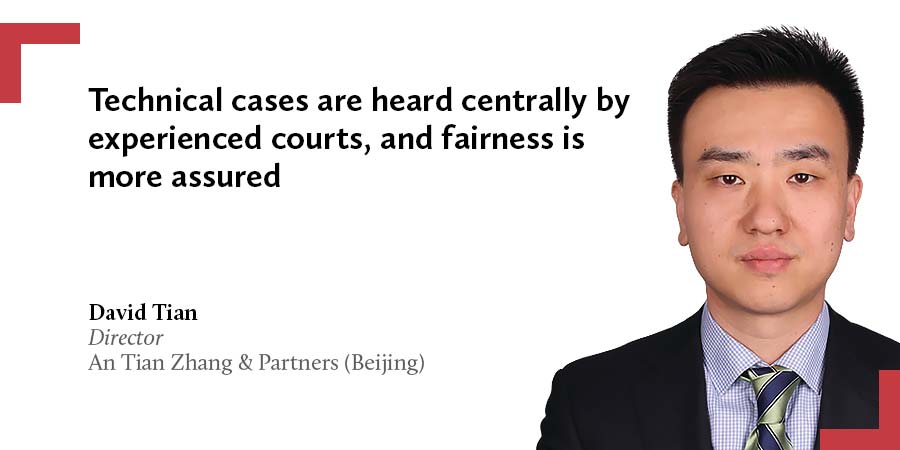
IP RIGHTS PROTECTION
Demand for legal services in the intellectual property (IP) area is particularly strong as the regulatory framework progresses and exemplary judicial practice cases emerge. Zhu, of Wanhuida, says: “Overall, the IP legal market in China continued last year’s boom in 2022, with steady activity in the area of determination of trademark rights and an unceasing increase in the number of cases in follow-up proceedings and administrative proceedings for trademark applications and registrations.”
China has completed a recent round of amendments to its IP laws covering areas such as patents, trademarks, copyright and trade secrets, and with the support of a system that has raised the upper limit of compensation and lowered the burden of proof there has been an increasing number of high award cases in recent years, which has encouraged companies to be more proactive in defending their rights in China.
Spring Chang, the Beijing-based founding partner of Chang & Tsi Partners, has seen a shift from foreign clients who used to end their cases with a finding of infringement in Chinese courts to a greater focus on compensation and enforcement. Accordingly, Chang says the firm has “adjusted its approach to handling cases on a firm-wide basis, shifting the focus of its litigation practice to compensation and enforcement”.
However, Hatty Cui, general manager of Rouse’s China business in Beijing, points out that because of the low cost of some infringement actions – for example bad-faith registration of trademarks – IP rights owners are still facing challenges when protecting their brands.
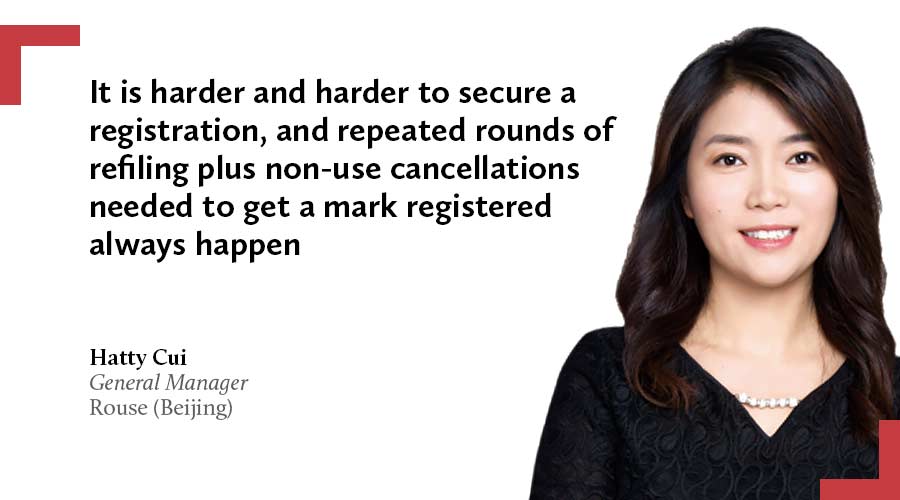
She says that although they are confident of combatting various bad-faith squatters, sometimes companies get frustrated “as it is harder and harder to secure a registration, and repeated rounds of refiling plus non-use cancellations needed to get a mark registered always happen”.
In addition to the amendments directly related to IP rights, a number of other laws have been amended to enhance the protection of IP rights.
Landy Jiang, head of Lusheng Law Firm’s Beijing litigation practice, notes that in the gaming sector the introduction of “technological protection measures” to protect copyright work circumvention into criminal law has meant that “gaming hardware right holders have, for the first time, been able to tackle with criminal enforcement action the crackdown on hardware and software that allowed the playing of pirated games”.
On another front, the newly amended Seed Law came into effect on 1 March, expanding the protection scope and aspects of new plant variety rights. David Tian, the Beijing-based managing partner of An Tian Zhang & Partners, says: “The protection of new plant varieties tends to be more stringent. Seed producers hold new plant variety rights and are becoming more active in defending their rights.”
At the administrative and judicial levels, however, positive and negative dynamics are at play. Tian observes that, nowadays, “technical cases are heard centrally by experienced courts, and fairness is more assured”.
But Cui adds: “We see the trend of rising rejection rates and stricter examination standards. What’s more, TRAD [the trademark review and adjudication department of the National Intellectual Property Administration] and the courts are unwilling to suspend cases when related cases are progressing.”
As technological advancements are more commonly seen in the country, homegrown companies in some industries have become leaders on a global scale, and are beginning to pay attention to the protection of their core technologies.
Xing Dongmei, the managing partner of East & Concord Partners in Beijing, says that emerging IP-related hotspots include the cultural and creative industries, artificial intelligence, the internet, the Internet of Things, and more.
“These hot sectors and complex IP litigations are placing new demands on the level, quality and competence of attorneys, and have been a war zone for heated peer competition in the past two years,” she says.





























